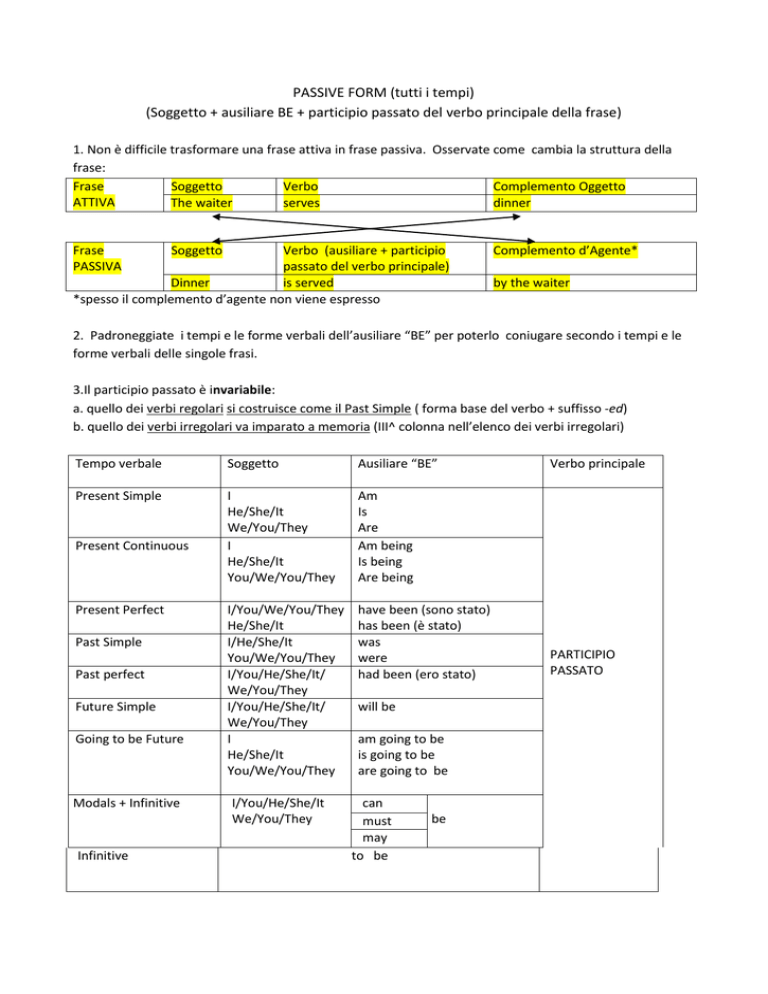
PASSIVE FORM (tutti i tempi)
(Soggetto + ausiliare BE + participio passato del verbo principale della frase)
1. Non è difficile trasformare una frase attiva in frase passiva. Osservate come cambia la struttura della
frase:
Frase
Soggetto
Verbo
Complemento Oggetto
ATTIVA
The waiter
serves
dinner
Frase
PASSIVA
Soggetto
Verbo (ausiliare + participio
passato del verbo principale)
Dinner
is served
*spesso il complemento d’agente non viene espresso
Complemento d’Agente*
by the waiter
2. Padroneggiate i tempi e le forme verbali dell’ausiliare “BE” per poterlo coniugare secondo i tempi e le
forme verbali delle singole frasi.
3.Il participio passato è invariabile:
a. quello dei verbi regolari si costruisce come il Past Simple ( forma base del verbo + suffisso -ed)
b. quello dei verbi irregolari va imparato a memoria (III^ colonna nell’elenco dei verbi irregolari)
Tempo verbale
Soggetto
Ausiliare “BE”
Present Simple
I
He/She/It
We/You/They
I
He/She/It
You/We/You/They
Am
Is
Are
Am being
Is being
Are being
I/You/We/You/They
He/She/It
I/He/She/It
You/We/You/They
I/You/He/She/It/
We/You/They
I/You/He/She/It/
We/You/They
I
He/She/It
You/We/You/They
have been (sono stato)
has been (è stato)
was
were
had been (ero stato)
Present Continuous
Present Perfect
Past Simple
Past perfect
Future Simple
Going to be Future
Modals + Infinitive
Infinitive
I/You/He/She/It
We/You/They
will be
am going to be
is going to be
are going to be
can
must
may
to be
be
Verbo principale
PARTICIPIO
PASSATO
Vediamo alcuni esempi
Tempo verbale
Soggetto
Ausiliare “BE”
Present Simple
The meal
The vegetables
is
are
cooked (cook)
Dinner
The vegetables
is being
are being
served (serve)
The table
The tables
has been
have been
set (set=preparare)
I
We
was
were
informed (inform)
I
We
had been
told the truth. (to tell the
truth=dire la verità)
I
We
will be
helped (help)
He
We
is going to be
are going to be
Interviewed (interview)
The table
The bill
The money
can
must
may
to be
Present Continuous
Present Perfect
Past Simple
Past perfect
Future Simple
Going to be Future
Modals + infinitive*
Infinitive*
be
be
be
Verbo principale
PARTICIPIO PASSATO
cleared (clear=sbarazzare)
paid (pay)
drawn (draw=prelevare)
allowed (allow=permettere/
consentire)
* L’infinito passivo generalmente segue un verbo modale.
4. FORMA NEGATIVA / FORMA INTERROGATIVA
La forma negativa e interrogativa del passivo si costruisce come quella dei tempi composti.
Cambia solo la posizione del soggetto e dell’ausiliare, il verbo principale non viene coinvolto.
Forma
affermativa
Forma negativa
Forma
interrogativa
Dinner
is
Dinner
Is
is
dinner
Forma
affermativa
Forma negativa
Forma
Dinner
has
Dinner
Has
has
dinner
served
not
not
served
served?
been
served
been
been
served
served?
interrogativa
